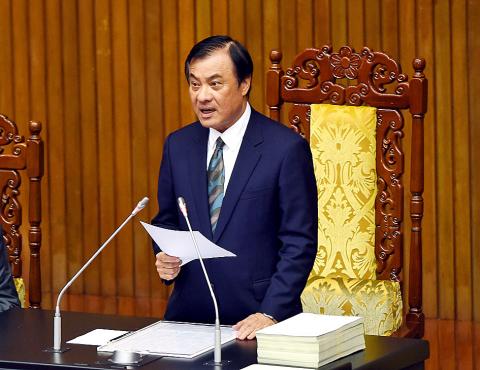The Democratic Progressive Party (DPP), the Chinese Nationalist Party (KMT) and the People First Party (PFP) yesterday agreed to prioritize the review of the central government budget at the Legislative Yuan’s extraordinary session.
At a cross-party negotiation held in Taipei to discuss the extraordinary session, which began yesterday and is to run through Friday next week, DPP caucus whip Ker Chien-ming (柯建銘) said he hoped the session could be simplified and focused on the national budget.
PFP Legislator Chou Chen Hsiu-hsia (周陳秀霞) and KMT caucus whip Johnny Chiang (江啟臣) also agreed that the budget should be the priority.

Photo: Huang Yao-cheng, Taipei Times
However, the New Power Party (NPP) suggested that the session also be used to discuss other matters.
NPP Legislator Hsu Yung-ming (徐永明) said that he does not oppose tackling the general budget at the extraordinary session, but it could, in response to President Tsai Ing-wen’s (蔡英文) New Year’s Day address, also be used to review bills related to the organization of a national transportation safety and investigation agency, immigration and the protection of classified national security information.
Legislative Speaker Su Jia-chyuan (蘇嘉全) said those bills could be prioritized for review in the next legislative session, which begins next month.
The Legislative Yuan should be able to reach a conclusion on those bills next month, he added.
With regards to the KMT caucus’ plans to boycott the review of the Transitional Justice Commission’s budget, Su urged lawmakers to express their opinions through other methods besides denying the budget request, which would render the commission unable to pay its staff.
He said the caucuses should be able to communicate and negotiate a solution, he said.
The KMT does not oppose transitional justice, but it must be “authentic” justice, Chiang said.
The commission has no official chairperson or deputy chairperson and should not be functioning, he said, adding that the vacant positions are still being filled illegally.
The commission must first earn the people’s trust, and only by functioning legally would it have a chance of doing so, he said.
It is therefore reasonable to freeze the budget before the commission officially nominates candidates to fill the chairperson and deputy chairperson seats, he added.

An essay competition jointly organized by a local writing society and a publisher affiliated with the Chinese Communist Party (CCP) might have contravened the Act Governing Relations Between the People of the Taiwan Area and the Mainland Area (臺灣地區與大陸地區人民關係條例), the Mainland Affairs Council (MAC) said on Thursday. “In this case, the partner organization is clearly an agency under the CCP’s Fujian Provincial Committee,” MAC Deputy Minister and spokesperson Liang Wen-chieh (梁文傑) said at a news briefing in Taipei. “It also involves bringing Taiwanese students to China with all-expenses-paid arrangements to attend award ceremonies and camps,” Liang said. Those two “characteristics” are typically sufficient

A magnitude 5.9 earthquake that struck about 33km off the coast of Hualien City was the "main shock" in a series of quakes in the area, with aftershocks expected over the next three days, the Central Weather Administration (CWA) said yesterday. Prior to the magnitude 5.9 quake shaking most of Taiwan at 6:53pm yesterday, six other earthquakes stronger than a magnitude of 4, starting with a magnitude 5.5 quake at 6:09pm, occurred in the area. CWA Seismological Center Director Wu Chien-fu (吳健富) confirmed that the quakes were all part of the same series and that the magnitude 5.5 temblor was

The brilliant blue waters, thick foliage and bucolic atmosphere on this seemingly idyllic archipelago deep in the Pacific Ocean belie the key role it now plays in a titanic geopolitical struggle. Palau is again on the front line as China, and the US and its allies prepare their forces in an intensifying contest for control over the Asia-Pacific region. The democratic nation of just 17,000 people hosts US-controlled airstrips and soon-to-be-completed radar installations that the US military describes as “critical” to monitoring vast swathes of water and airspace. It is also a key piece of the second island chain, a string of

The Central Weather Administration has issued a heat alert for southeastern Taiwan, warning of temperatures as high as 36°C today, while alerting some coastal areas of strong winds later in the day. Kaohsiung’s Neimen District (內門) and Pingtung County’s Neipu Township (內埔) are under an orange heat alert, which warns of temperatures as high as 36°C for three consecutive days, the CWA said, citing southwest winds. The heat would also extend to Tainan’s Nansi (楠西) and Yujing (玉井) districts, as well as Pingtung’s Gaoshu (高樹), Yanpu (鹽埔) and Majia (瑪家) townships, it said, forecasting highs of up to 36°C in those areas